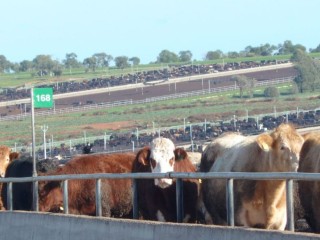 This week’s Productivity Commission report into carbon emission policies in key economies has confirmed lotfeeders’ long-held view that subsidies provided to the ethanol sector are a poor use of tax payers’ money.
This week’s Productivity Commission report into carbon emission policies in key economies has confirmed lotfeeders’ long-held view that subsidies provided to the ethanol sector are a poor use of tax payers’ money.
Australian Lot Feeders Association president Jim Cudmore said the report objectively concluded that subsidies such as the current and proposed fuel excise arrangements for Australian ethanol manufacturers were extremely costly, yet provided little emission benefit.
Lotfeeders have consistently argued that they have no problem competing for grain against the biofuels industry, provided no unfair subsidies are applied to create an unfair playing field.
“The report states that the $144 million provided to the Australian biofuels industry in 2010 was among the highest of the studied countries on a per-litre and percentage of GDP basis, yet it contributed to only a 0.6pc reduction in emissions,” Mr Cudmore said.
With Australian Government subsidies also costing a significant $364 per tonne of carbon saved, and such results being consistent with all studied countries, the report confirmed that the money spent in Government assistance and protection for the biofuels industry could be better spent elsewhere, he said.
“Curiously, $108 million or 75pc of the subsidies provided to the Australian biofuel industry in 2010 were given to ethanol producers, when the abatement potential of biodiesel is significant higher,” he said.
“Arguments that the fuel excise arrangements do not represent a subsidy are clearly incorrect.
Under General Agreement on Tariffs and Trade (GATT) rules, of which Australia is a signatory, the non-payment of a tax which contributes to Government revenue is a subsidy.”
The report contributed to the considerable weight of studies which confirmed that the costs of Government assistance and protection for the ethanol industry far outweighed the benefits, Mr Cudmore said.
Meanwhile, at a state level, the NSW Government is currently reviewing its Biofuels Act – the legislation which imposes the mandate on ethanol content in regular unleaded petrol.
While the mandate is currently suspended, due mostly to supply issues, with a new NSW Government in place, lotfeeders are continuing to press for the legislation to be repealed.
Recently ALFA lodged a submission in response to the review.
“The review issues paper makes an attempt to argue that the development of a sustainable biofuels sector has been delivered and that a number of benefits have been achieved,” ALFA executive director Dougal Gordon said.
The claimed benefits included regional development, air quality, greenhouse gas emissions, fuel security and cheaper fuel.
ALFA argued in its submission that those claimed benefits and objectives had not been delivered, and as a result the Act should be repealed.
“In terms of a sustainable biofuels industry, we argued that the recent suspension of the NSW and Queensland mandates, the voluntary administration of the Dalby bio-refinery and the lack of commercialisation of countless proposed biofuel facilities demonstrate that the Act has not achieved its objective,” Mr Gordon said.
“On the global front, food-versus-fuel pressure from Government biofuel policies has been a major contributing factor that has seen world grain, beef, pork and chicken stocks reduce to levels not seen since the 1970s, and world food prices increase to unprecedented levels,” he said.
On the regional development front, only 25 new permanent full-time equivalent jobs had been created since the Act commenced, ALFA suggested. Each of those came at a cost of $10.9m, given the fuel excise subsidy provided by the Federal Government.
“The issues paper also attempts to argue that the legislation has provided cheaper fuel for consumers.
However, the Australasian Convenience and Petroleum Marketers Association has determined that E10 needs to be at priced at least 3.5c/ litre less than Regular Unleaded Petrol (RUP) in order for motorists to achieve the equivalent value for money. The ACCC determined that for 2009/10 the average price differential was only 2.6c/ litre.
“Those motorists with incompatible E10 vehicles are also worse off as a result of the mandate as they are being forced to pay up to 12c/litre more for premium unleaded petrol as RUP increasingly becomes unavailable,” Mr Gordon said.
